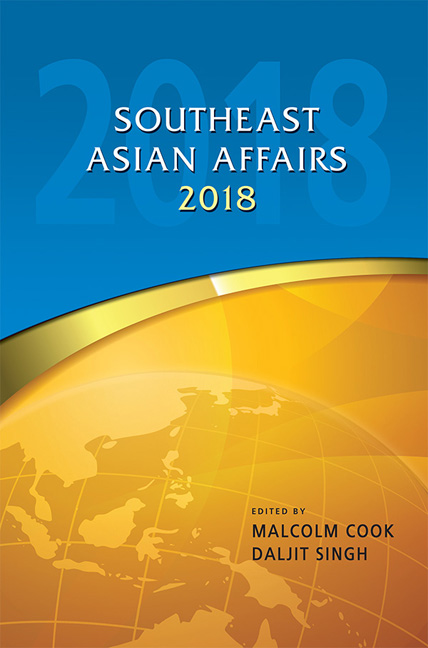Book contents
- Frontmatter
- Contents
- Introduction
- Acknowledgements
- THE REGION
- BRUNEI DARUSSALAM
- CAMBODIA
- INDONESIA
- LAOS
- MALAYSIA
- MYANMAR
- THE PHILIPPINES
- The Philippines in 2017: Turbulent Consolidation
- Narratives and Counter-Narratives: Responding to Political Violence in the Philippines
- SINGAPORE
- THAILAND
- TIMOR-LESTE
- VIETNAM
Narratives and Counter-Narratives: Responding to Political Violence in the Philippines
from THE PHILIPPINES
Published online by Cambridge University Press: 08 June 2019
- Frontmatter
- Contents
- Introduction
- Acknowledgements
- THE REGION
- BRUNEI DARUSSALAM
- CAMBODIA
- INDONESIA
- LAOS
- MALAYSIA
- MYANMAR
- THE PHILIPPINES
- The Philippines in 2017: Turbulent Consolidation
- Narratives and Counter-Narratives: Responding to Political Violence in the Philippines
- SINGAPORE
- THAILAND
- TIMOR-LESTE
- VIETNAM
Summary
Political violence has defined Philippine politics for decades. It has been used by different agents in order to achieve their political goals. In local politics, bosses and warlords have included it as part of their repertoire to remain in power. Non-state actors like the communist New People's Army and the different Moro (Muslim Filipino) groups have used violence as leverage in peace negotiations. Terrorists and criminal groups also use violence to achieve material and non-material goals. The national government struggles to have a monopoly on the legitimate use of violence in some areas, including Mindanao. The lack of resources also undermines the ability of national security forces to keep local warlords and non-state armed actors in check. As a result, groups that use political violence thrive in some areas of the Philippines.
It is important for the Philippine state to assert its monopoly of the use of legitimate violence to suppress armed non-state actors. This is well understood by the new Philippine president. In the first State of the Nation Address of Rodrigo Duterte, he promised to strengthen the Armed Forces of the Philippines and the Philippine National Police. He also called for lifestyle checks among members of the security forces to ensure that they do not have corrupt members. These are prerequisites in Duterte's declaration of war against terrorism, criminality and illegal drugs. While the promise of this war on criminality, drugs and terrorism was a reason for Duterte's successful election campaign, human rights groups and the international community have been critical of the government's implementation of the programme after more than seven thousand people have died in the process. An ensuing war against the communist party, which Duterte declared a terrorist group, will most likely increase the number of casualties.
Moreover, in the first year of the Duterte presidency, the use of political violence by terrorist groups in occupying the city of Marawi in the southern island of Mindanao has been touted by International Alert as a new form of vertical conflict (i.e., a conflict between the national government and a non-state armed actor). Marawi City was declared liberated from terrorist groups by Duterte in October 2017, after four months of fighting. According to the Philippine military, the conflict dragged on because they have yet to develop urban warfare capabilities and because the terrorist groups were well prepared.
- Type
- Chapter
- Information
- Southeast Asian Affairs 2018 , pp. 285 - 296Publisher: ISEAS–Yusof Ishak InstitutePrint publication year: 2018



